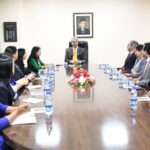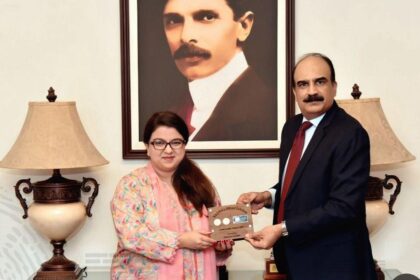The Women’s Parliamentary Caucus (WPC) of Pakistan hosted a high-level delegation of Nepali women parliamentarians and civil society representatives in Islamabad to promote the exchange of best practices in Gender-Responsive Budgeting (GRB). The meeting, facilitated by Friedrich-Ebert-Stiftung (FES), focused on how countries in South Asia can advance gender equality through stronger legislative frameworks and more inclusive budgetary policies.
Dr. Shahida Rehmani, Secretary of the WPC and Member of the National Assembly, welcomed the Nepali delegation by highlighting Pakistan’s progress in institutionalizing gender-sensitive reforms. She stressed that GRB is essential to ensuring national resources are allocated according to the needs of women and marginalized groups, and noted that empowering women in this process helps shape national policies and priorities more effectively.
Representatives from Nepal shared several initiatives designed to empower women, such as mandatory quotas for women in governance, scholarship programs for girls, lower taxes for property registered in women’s names, and subsidized loans for female entrepreneurs. They also discussed the difficulties in establishing an effective parliamentary caucus in Nepal, and praised Pakistan’s Women’s Parliamentary Caucus for its pioneering leadership in the region.
Pakistan’s parliamentarians shared ongoing reforms, with Dr. Nafisa Shah, Chairperson of the Special Committee on Gender Mainstreaming, emphasizing the collaborative efforts between the WPC and her committee to address discriminatory laws and reduce the gender gap. Senator Fauzia Arshad highlighted Pakistan’s legislative advances in combating child marriage, enhancing inheritance rights, criminalizing honor killings, and integrating gender considerations across all legislative areas.
Participants reviewed Pakistan’s Gender Budgeting Strategy and discussed the methodology for tracking government spending related to social services, economic empowerment, the response to gender-based violence, and climate resilience. Attention was also given to ongoing consultations for upcoming federal budgets, aiming to ensure that gender equity remains a key priority.
The exchange concluded with a mutual commitment to stronger collaboration between women parliamentarians from Pakistan and Nepal, including plans for a reciprocal visit by Pakistan’s Women’s Parliamentary Caucus to Nepal, signaling ongoing efforts to build regional partnerships for gender equality.











